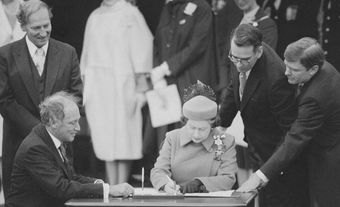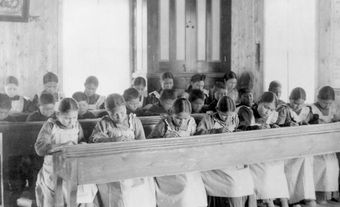
Official Secrets Act
Official Secrets Act, the most important statute relating to national security, is designed to prohibit and control access to and the disclosure of sensitive government information; offences cover espionage and leakage of government information. The term "official secrets" is not defined comprehensively in the legislation, but broadly, official secrets may be considered any information of an official character and can be restricted from public access for up to 30 years. It is clear that prohibited places, code words, passwords, plans, models, and articles, notes or other documents can be regarded as official secrets under the act.
There is some controversy over whether information involved must be secret (in Britain there is no such requirement). In the 1978 prosecution of the Toronto Sun, the judge presiding at the preliminary inquiry assumed that the information did indeed have to be secret. In one 1948 case the Québec Court of Appeal determined that the act does not apply to information that has been published, publicized or has fallen into the public domain. By contrast, in the recent (1987) English "Spycatcher" case (involving the upholding, by the House of Lords, of an injunction banning publication of the memoirs of a former British counterintelligence agent), Lord Ackner wrote that "the cat is indeed out of the bag, but ... there is all the difference in the world between tolerating importation of casual copies as opposed to mass circulation of the material."
The first Official Secrets Act was passed in England in 1889 and with minor modifications became law in Canada in 1890. In 1892 its provisions were transferred to the first Criminal Code of Canada until their repeal and replacement by the Official Secrets Act, 1939. This new act combined into one the English Acts of 1911 and 1920. Minor changes were made in 1950, 1967 and 1970. Also, an important addition was made in 1973 in the form of a broad power to conduct wiretap investigations pursuant to executive, as opposed to judicial, authorizations.
The Mackenzie Royal Commission on Security Procedures of 1969 described the legislation as "an unwieldy statute couched in very broad and ambiguous language" and one possessing "unusual" and "extraordinarily onerous" evidentiary and procedural provisions relating to espionage cases. Successive royal commissions have criticized the broad powers of search and seizure conferred under the legislation of substantive offences, eg, leakage of classified information, created by the statute.
Over 50% of the 22 Canadian prosecutions under the Official Secrets Act arose as a result of the defection of Igor Gouzenko in 1945 and his revelations about a series of Soviet spy rings operating in Canada. Only a handful of prosecutions have occurred since 1961. Two cases involved the leakage provisions of the act, and in both of these 1978 prosecutions, charges were dismissed. The most recent prosecution was the so-called "Longknife" case. In it, James Morrison (code-named Longknife) was charged with conspiracy to breach the provisions of the act and passing secret information to Russian agents between 1955 and 1958. These 1983 charges were pressed after Morrison gave interviews to television and print media in 1982 respecting his RCMP intelligence work. Morrison initially challenged the validity of the 30-year-old proceedings brought against him as being in violation of the Canadian Charter of Rights and Freedoms' guarantee of trial within a reasonable time. His trial on the 3 charges abruptly ended with a plea of guilty to one of the charges against him. He was sentenced to 18 months in prison.
The Royal Commission of Inquiry Into Certain Activities of the Royal Canadian Mounted Police (McDonald Commission) noted in 1979 that "much more is needed by way of legislative reform than the mere dismantling of the Official Secrets Act and the recognition of espionage and leakage as separate kinds of offences. The definition of these offences in the Official Secrets Act leave much to be desired ... It is now time for this part of our law to be revised so that it is both clear and in tune with the values and needs of contemporary Canada." Despite these and other calls for an overhaul of the act, it remains essentially unaltered. See also Intelligence and Espionage.

 Share on Facebook
Share on Facebook Share on X
Share on X Share by Email
Share by Email Share on Google Classroom
Share on Google Classroom


